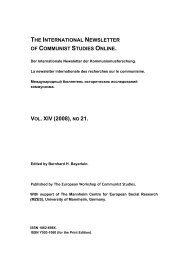11RXNdQ
11RXNdQ
11RXNdQ
You also want an ePaper? Increase the reach of your titles
YUMPU automatically turns print PDFs into web optimized ePapers that Google loves.
Colonialism and Neocolonialism 82<br />
themselves: let it be granted as quickly as possible and let them then attempt, by peaceful<br />
undertakings, to deserve it. Our well-meaning souls are racist.<br />
They will benefit from reading Fanon; this irrepressible violence, as he demonstrates<br />
perfectly, is not an absurd storm, nor the resurrection of savage instincts, nor even an<br />
effect of resentment: it is no less than man reconstructing himself. We knew this truth, I<br />
think, but we have forgotten it. No gentleness can efface the marks of violence; it is<br />
violence alone that can destroy them. And the colonized cure themselves of the colonial<br />
neurosis by driving out the colon with weapons. When their rage explodes, they recover<br />
their lost transparency, they know themselves in the same measure as they create<br />
themselves; from afar, we regard their war as the triumph of barbarism; but it leads by<br />
itself to progressive emancipation of the fighters, it progressively liquidates the colonial<br />
darkness within and outside them. Once it starts, it is merciless. One must remain<br />
terrified or become terrible; that is to say: abandon oneself to the dissociations of a<br />
falsified life or conquer native unity. When the peasants pick up guns, the old myths pale,<br />
prohibitions are one by one overturned: the fighters’ weapons are their humanity. For, at<br />
this first stage of the revolt, they have to kill: to shoot down a European is to kill two<br />
birds with one stone, doing away with oppressor and oppressed at the same time: what<br />
remains is a dead man and a free man; the survivor, for the first time, feels national soil<br />
under his feet. At this instant, the nation does not desert him: it is found wherever he<br />
goes, wherever he is – never any further away, it merges with his freedom. But, after the<br />
first surprise, the colonial Army reacts: it must unite or be massacred. Tribal discords<br />
diminish and tend to disappear: first because they endanger the Revolution, and more<br />
importantly, because their only purpose was to divert the violence towards false enemies.<br />
When they remain – as in the Congo – it is because they are kept alive by the agents of<br />
colonialism. The nation moves into action: for every brother, it is everywhere where<br />
other brothers are fighting. Their fraternal love is the opposite of the hate they have for<br />
you: they are brothers in that each of them has killed, can kill, from one instant to the<br />
next. Fanon demonstrates to his readers the limits of ‘spontaneity’, the necessity and the<br />
dangers of ‘organization’. But, however immense the task may be, at every stage of its<br />
undertaking, revolutionary awareness deepens. The last complexes vanish: let them come<br />
and talk a little to us about the ‘dependency complex’ of the ALN soldiers. Freed from<br />
his blinkers, the peasant becomes aware of his needs: they used to kill him and he tried to<br />
ignore them; but now he sees in them an infinite necessity. In this violence of the people<br />
– to hold out for five years, eight years as the Algerians have done – military, social and<br />
political necessities cannot be distinguished from each other. Even if only in asking the<br />
question of command and responsibilities, war institutes new structures which will be the<br />
first institutions of peace. Here, then, human beings are established even in new<br />
traditions, the future daughters of a horrible present, here they are legitimated by a right<br />
which is about to be born, which is being born each day in the fire: when the last colon is<br />
killed, shipped back home or assimilated, the minority species disappears, giving way to<br />
socialist fraternity. And that is not yet enough: these fighters rush ahead; you can be sure<br />
they are not risking their skin to find themselves in the same position as the old colonial<br />
man. Look at their patience: perhaps they dream sometimes of a new Dien Bien Phu; but<br />
do not believe that they really expect it: they are beggars struggling, in their<br />
wretchedness, against rich people, powerfully armed. While waiting for the decisive




